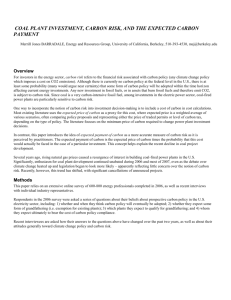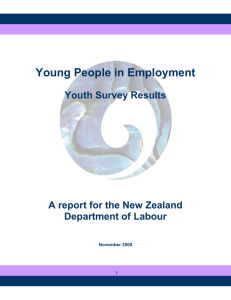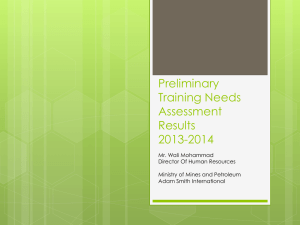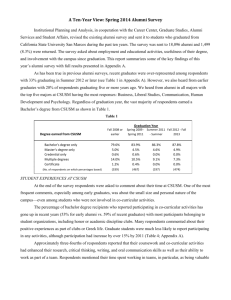Teaching Fellows Satisfaction Survey Background This survey was
advertisement
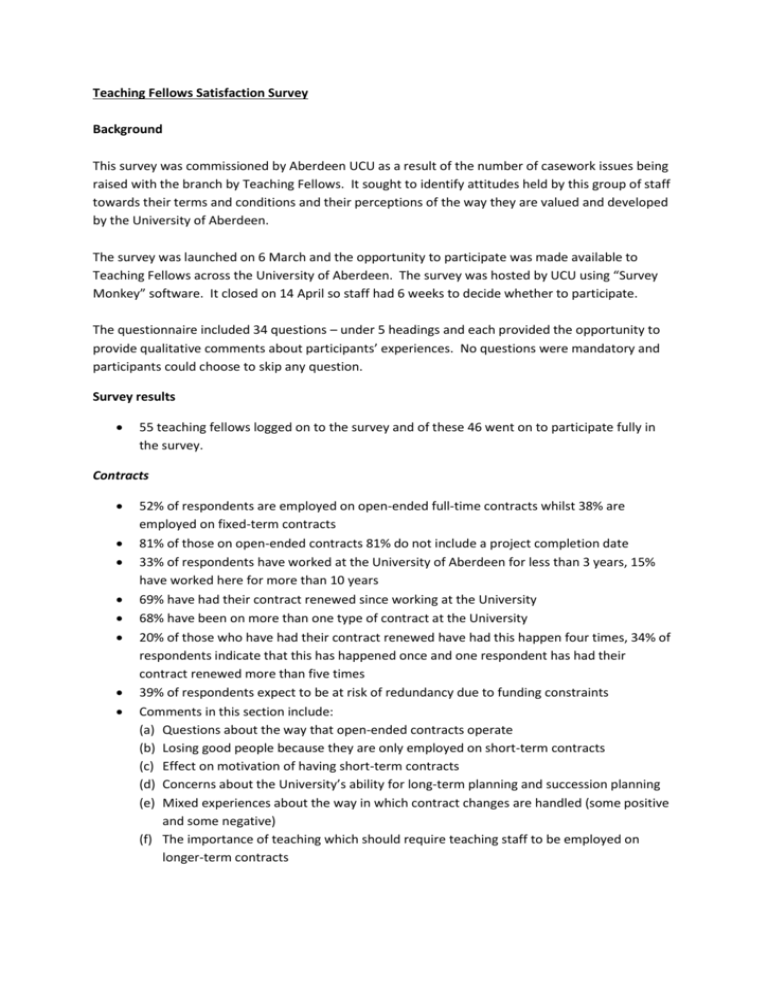
Teaching Fellows Satisfaction Survey Background This survey was commissioned by Aberdeen UCU as a result of the number of casework issues being raised with the branch by Teaching Fellows. It sought to identify attitudes held by this group of staff towards their terms and conditions and their perceptions of the way they are valued and developed by the University of Aberdeen. The survey was launched on 6 March and the opportunity to participate was made available to Teaching Fellows across the University of Aberdeen. The survey was hosted by UCU using “Survey Monkey” software. It closed on 14 April so staff had 6 weeks to decide whether to participate. The questionnaire included 34 questions – under 5 headings and each provided the opportunity to provide qualitative comments about participants’ experiences. No questions were mandatory and participants could choose to skip any question. Survey results 55 teaching fellows logged on to the survey and of these 46 went on to participate fully in the survey. Contracts 52% of respondents are employed on open-ended full-time contracts whilst 38% are employed on fixed-term contracts 81% of those on open-ended contracts 81% do not include a project completion date 33% of respondents have worked at the University of Aberdeen for less than 3 years, 15% have worked here for more than 10 years 69% have had their contract renewed since working at the University 68% have been on more than one type of contract at the University 20% of those who have had their contract renewed have had this happen four times, 34% of respondents indicate that this has happened once and one respondent has had their contract renewed more than five times 39% of respondents expect to be at risk of redundancy due to funding constraints Comments in this section include: (a) Questions about the way that open-ended contracts operate (b) Losing good people because they are only employed on short-term contracts (c) Effect on motivation of having short-term contracts (d) Concerns about the University’s ability for long-term planning and succession planning (e) Mixed experiences about the way in which contract changes are handled (some positive and some negative) (f) The importance of teaching which should require teaching staff to be employed on longer-term contracts Working hours 76% of respondents are employed to work more than 26 hours per week 73% of respondents are required to fulfil between 6 and 15 hours’ contact time per week during term time 54% of respondents spend more than 21 hours per week of non-contact hours on top of teaching – including staff who are required to deliver between 6 and 10 hours teaching 6 respondents indicated that they typically work more than 50 hours per week 65% of respondents stated that the hours that they are contracted to work are not an accurate reflection of the hours they actually work and that compromising on preparation activity still does not allow the opportunity to work the contracted number of hours Comments were made about the lack of available information about the hours that teaching fellows are required to work, the variations between departments and schools and the hours that are required to fulfil the expected duties – with some part-time staff having to work almost full time to get the job done. Respondents were provided with the opportunity to comment about working hours and this open-ended question solicited the highest number of responses of all those asked. Concerns revolved around: (a) The amount and turnaround times for assessment takes a significant amount of time which requires staff to work evenings and weekends to keep up and in some cases means that respondents are unable to take their annual leave entitlement (b) Insufficient time available to undertake innovative tasks/research which limits progression (c) A minority of respondents indicate that they work long hours in order to undertake unpaid research in order to progress (d) The amount of time allocated for different tasks is inaccurate and in some instances the complexity of tasks is not understood meaning that the number of contracted hours is incorrect and the method of calculating hours appears to be opaque to many (e) A number of respondents expect to work the hours required to deliver what is required and indicate that there is flexibility with regard to when work is done and reduced hours between teaching terms (f) A concern was raised about whether the rate of pay for teaching fellows is standardised across the University Job descriptions 36% of respondents do not have a job description for their role Of those who have a job description only 30% (7 respondents) have a HERA scored job description – the others have “further particulars” One respondent indicates that they have a HERA scored job description customised to reflect their particular role 61% of respondents indicate that their job description does not accurately reflect the job that they do Comments raised in this section include: (a) Roles changing due to contract renewals/change in funding source/hours and duties changing but no new job descriptions are being written and agreed (b) The amount of time required to undertake a variety of different tasks is not understood or reflected in job descriptions (c) Some tasks (particularly admin) are not reflected in job descriptions (d) The generic way in which jobs and contracts are offered and the level of interpretation that is acceptable (e) The amount of time required to teach does not allow time for other elements of HERA requirements therefore a low score is only possible and a national framework does not reflect local requirements



